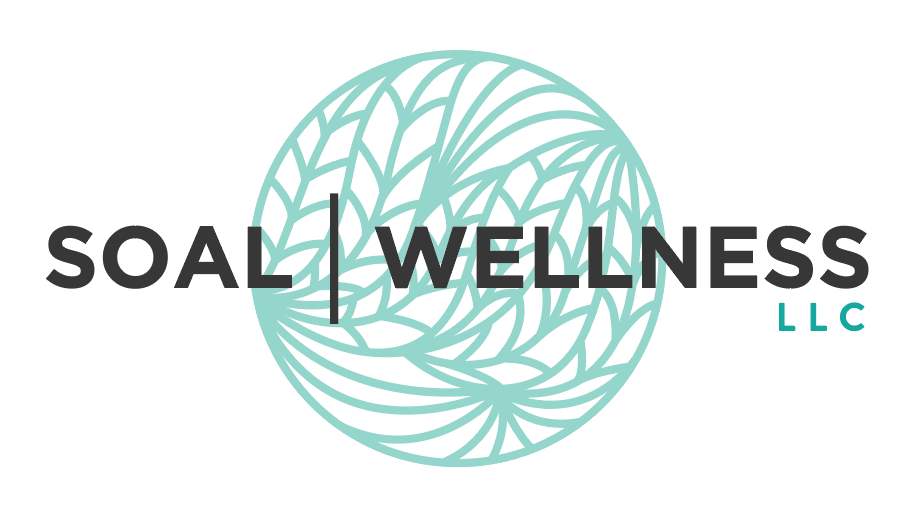image-slider-with-thumbnail1.jpeg

Start now on your Journey to Excellent Health
• Medical Weight Loss
• Nutrition
• Functional Medicine
• Nutrition
• Functional Medicine
Are you frustrated with traditional medicine and looking for answers?




What Makes Us Different?
We offer individualized and compassionate care to every client. We know that your health needs and goals are personal and specific to you.
Instead of quick fixes or one size fits all solutions, we use a root cause approach to optimize health and tackle frustrating health problems.
Our approach to whole health includes an in-depth look at all aspects of your health because EVERY SYMPTOM MATTERS.
Every new client evaluation includes:
- Complete medical history, including current health concerns and goals
- Nutrition assessment
- Body composition assessment
- Symptom review
- Genetics review

PREVIOUS CLIENTS REVIEWS

Julie and Soal Wellness are absolutely amazing!!!I have been struggling with digestive issues along with acid reflux and heartburn for close to 4 years and not a single doctor could figure out what was wrong with me.After meeting with Julie a couple times she suggested that I take a gut microbiome test.Well lo and behold we found out that I had a parasite in my gut!!After taking therecommended antibiotics for a couple weeks I can absolutely say that my symptoms and issues have drastically been reducedand feel so much better now.Thank you!!!
Dr Hinman is phenomenal in wellness. She seeks to get to the root cause to heal you for long term longevity versus simply treating symptoms. She’s helped me as a health advocate as well as with an accident I had. She always takes her time with consulting with her patients, never rushing them out. I highly recommend Dr Hinman.
Julie is a rockstar! If you’re looking for ways to live longer, healthier and overall just feel better don’t hesitate to schedule a consultation with her!
Love Julie! She is so knowledgeable and truly cares to find the root cause of problems.
Stephanie Espinoza, MA, RDN, LRD, has been an amazing guide for a weight loss challenge I had given up on. After COVID and later becoming caretaker for a family member with dementia, my eating and lifestyle got out of control and resulted in a weight gain of over 80 lbs. I was unmotivated and somewhat resigned. Stephanie brought the structure, education and encouragement that helped me make positive changes and shed the weight over a period of about 8 months with no feelings of starvation or the emotional ups and downs that often accompany weight loss attempts. Her approach is sound scientifically and psychologically and I’d encourage anyone who struggles with making changes necessary for successful weight loss and the ability to sustain it, to contact Stephanie. She has an obvious passion and brings a wealth of knowledge and skills.Daniel G.
I've been seeing Julie and Stephanie at Soal Wellness for about a year. Julie has taught me so much about how workouts, sleep and stress and how it effects my overall recovery. Which has helped so much with my recovery.Stephanie as being a dietician has taught me so much about food. What to eat before workouts and after. What foods that can replace taking so many supplements. They both have given me the confidence to manage my food and recovery. Thank you so much for all you help and support.
Julie and Stephanie CARE. They take the time to really listen to what their clients have to say, because they are looking to do more than prescribe a pill and send their people on their way.I feel cared about by both of them and would recommend these compassionate individuals to anyone who is looking for a solution to the root cause of their issue.You can feel how they are passionate about what they do! They promote self-care and I agree 100%!
Soal Wellness utilizes data driven and results focused techniques to achieve wellness for their clients while taking time to understand the personal and individual challenges facing their patients. Julie and Stephanie are professional medical practitioners who provide knowledge, tools, and understanding of what it takes for patients to achieve their goals and putting them on a path for long-term success. I highly recommend Soal Wellness LLC for anyone interested in applying informed and thoughtful practice to their personal wellness journey.
Julie Hinman at Soal Wellness is a remarkable weight loss clinic who has transformed not just my body, but my entire perspective on health and wellness.From the moment I walked into the clinic, I was greeted with warmth and genuine care from the staff and Julie. What truly sets her apart is the holistic approach she takes towards weight loss and overall well-being. It's not just about shedding pounds, but about embracing a healthier lifestyle in every aspect.Julie's knowledge and expertise are evident in every step of the process. She took the time to thoroughly understand my medical history, personal goals, and preferences before tailoring a comprehensive plan that suited me perfectly. This individualized approach made me feel valued and understood, unlike any other experience I've had with healthcare professionals.I appreciated the time Julie took to teach me about why we were doing what we were doing. They don't just hand out a generic diet and exercise plan; instead, she explained the science behind the choices and adjustments we were making. This allowed me to make better decisions.The journey was not always easy, but Julie's unwavering support and encouragement kept me motivated even during challenging times. She emphasized the importance of not just physical health, but also mental and emotional well-being. This holistic approach truly transformed my mindset and relationship with food, exercise, and self-care. (Julie is BIG on self-care.)If you're looking for a weight loss doctor who sees you as a whole person and is dedicated to your success both inside and out, I wholeheartedly recommend Julie. She is a game-changer, and I am so grateful to have had the opportunity to be her patient.
This team at Soal is the absolute best. I was frustrated with adhoc tests at various doctors with no logical results. Julie was able to connect the dots and look at the big picture. My health is better than ever. I needed to lose weight. Stephanie jumped in for the nutritional side and the team of the two has me lower in weight than I have been in 30 years. I feel great and my confidence is off the chart. They not only provide medical advice, they supply great support and friendship.
Stephanie and Julie, are simply amazing people to work with. The made my fat loss journey a easy one. They have a no food is bad for you approach and just have you understand that there are better ways to fuel your body. I am truly grateful for the knowledge and support. I can tell without a doubt you will be successful in your nutritional routine.
Julie truly cares about her patients and takes the time to learn about their unique needs. I am grateful she is able to share her wisdom and knowledge with us.
Julie is knowledgeable, kind, experienced, and compassionate. She is a great guide if you are having trouble losing weight/getting healthy. It's much more than just working out, and she will teach you all of that. Health is the best investment you can make & working with Julie is an amazing step to take.
Working with Julie has been a breath of fresh air. She takes a whole health approach and breaks down the barriers. I feel knowledgeable, supported and understood on a personal level. Getting here has been a profound trip for sure but I am building on the things she has taught me to advocate for my future. Feeling better moving better, and supporting my body has never felt so good. Not to mention I can eat without so much shame and guilt. Thank you !
Working with Julie at Soal Wellness helped me to dig down to the core of my eating habits. We started with basic day to day goals with no shame even when I would "accidentally" eat a bag or two of Cheetos. She gave me simple delicious recipes and got me cooking with fresh foods. I never thought I would kick my lifelong addiction to Diet Pepsi but with Julie's gentle urging I was able to quit! Julie's understanding and encouragement helped me to achieve a healthier lifestyle.
Dr. Julie is very knowledgeable and great at what she does. I came in with concerns about my general health and wondering what it was I needed to meet my physical fitness goals and gain some muscle mass. Dr. Julie took the time to sit with me and talk about my history, current symptoms, and goals and then came up with an individualized plan of what I would need to accomplish my goals. She was thorough and explained everything. It can be hard to find a doctor that cares this much but she truly does. I highly recommend her if you have concerns about your health and goals with your weight or fitness.
















